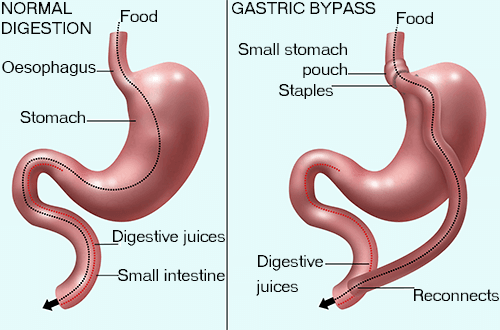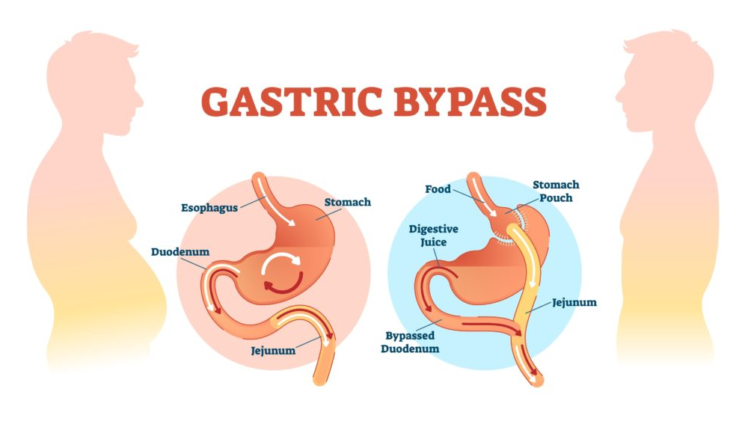What you need to know about Gastric Bypass Procedure
Contents
Gastric bypass is a type of bariatric surgery (weight loss surgery) used to help people with morbid obesity lose significant weight. The procedure reduces the size of your stomach, so you cannot eat as much as you used to. It also reroutes or bypasses, most part of your digestive system, so your body does not absorb as much food.
Gastric bypass is one of the most successful bariatric surgery for sustained, long-term weight loss. Besides aiding dramatic weight-loss, it may also improve or resolve weight-related diseases, such as type 2 diabetes, heart disease, gastroesophageal reflux disease, high blood pressure, high cholesterol, stroke, obstructive sleep apnea, and infertility.
While gastric bypass is an effective way to lose weight and reduce the risk of weight-related problems, not everyone who is severely overweight can have it. The procedure is generally an option for you if your body mass index (BMI) is 40 or higher, or your BMI is between 35 and 39.9, but you have a serious weight-related disease. Since gastric bypass is a major and irreversible surgery that involves permanent changes, it should only be done after you have tried to lose weight by diet and exercise.

What does the Procedure Involve?
During a gastric bypass, you will be given general anesthesia so you will be asleep and comfortable throughout the whole procedure. The procedure can be done through open surgery (one large incision is created in the abdomen) or minimally invasive (six to seven small incisions are made in the abdomen to insert a laparoscope and tiny surgical instruments). The latter is more preferred today.
After creating the incisions, your surgeon cuts across the top of your stomach to seal it off from the rest of your stomach. This essentially divides your stomach into two parts: a smaller pouch about the size of a walnut and a larger pouch. Then, your small intestine is cut and part of it is sewn directly onto the smaller pouch. After gastric bypass, food goes into the small pouch and then directly into the middle part of the small intestine sewn to it, bypassing the larger pouch and small intestine.
Because your anatomy is altered, you will feel full faster and stay full for longer, which will eventually result in rapid weight loss.
How Long Should I Stay at the Destination?
Gastric Bypass takes 2 to 4 hours to complete. After the surgery, you will need to stay in the hospital for around 3 to 5 days. During your stay, your overall health and healing progress will be closely monitored. After you are discharged from the hospital, do not leave the area immediately. Plan to stay at least 14 more days because you will need to attend follow-up checkups. Your surgeon will remove your stitches within 7 to 10 days following the surgery.
What’s the Recovery Time?
The total period of recovery following a gastric bypass may take around 4 to 6 weeks. For the first few weeks, you may experience moderate to severe pain, but your surgeon will prescribe pain medication to ease the discomfort. You may also experience swelling and bruising around your surgical wounds, which will subside within a few weeks. You may be able to resume your normal activities in 4 to 5 weeks, but make sure to talk to your surgeon about your recovery timeline to avoid any complications.

What About Aftercare?
During your recovery period, your surgeon will give you a special diet plan that you have to follow. This diet plan changes slowly from liquids to pureed foods, to soft foods, then move on to firmer foods when your body can tolerate them. Your surgeon will also give you detailed post-operative instruction that you need to abide by.
To maximize and maintain weight loss, you have to commit to healthy eating and regular exercise. Your surgeon may give you restrictions on how much and what you can eat and drink. You may also have to take vitamin and mineral supplements, such as a multivitamin with vitamin B-12, iron, and calcium. All eating habits will have to be adjusted as well; you may have to eat 6 small meals every day instead of 3 large meals. Additionally, you will need to attend frequent medical checkups to monitor your progress.
What’s the Success Rate?
In the last few years, the success rate of gastric bypass surgery has increased significantly. While the amount of weight you lose is determined by your change in lifestyle habits, it is possible to lose 60% or more of your excess weight within two years following the surgery. Over a third of patients who have had a gastric bypass lost 80% of their excess weight. Also, 90% of patients maintain a loss of 50% of their original body weight within ten years after their gastric bypass.
As with any surgical procedure, gastric bypass also comes with some potential drawbacks. Many patients experience “dumping syndrome,” which happens when food moves too quickly from your stomach to your small intestine, causing weakness, nausea, diarrhea, sweating, and fainting.
There is also a risk of malnutrition because your body’s ability to absorb nutrients is reduced. This is why it is important that you take vitamin and mineral supplements each day. Other risks include infection, excessive bleeding, blood clots, lung problems, gallstones, hernias, low blood sugar, and stomach perforation.
Are there Alternatives to Gastric Bypass Procedure?
Alternative Bariatric Procedures:
1. Gastric Band – An inflatable silicone device is fitted around the top portion of the stomach to create a smaller stomach pouch, intended to decrease the amount of food consumed in one go.
2. Gastric Sleeve – The stomach is reduced to about 15% of its original capacity by surgically removing a large portion of it, resulting in a sleeve or tube-like structure. This process is irreversible.
3. Gastric Balloon – An inflatable device is temporarily inserted into the stomach via endoscopic placement. The balloon obstructs a sizable area of the stomach, thus reducing the amount of food it can contain at any one time.
For an in-depth analysis of the pros and cons of a Gastric Bypass Procedure, watch this short video.
To check prices or to book a Gastric Bypass Procedure in Thailand or anywhere else in the world, head on over to MyMediTravel now!

